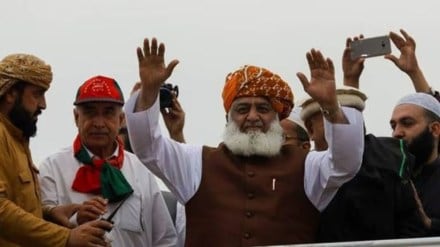Maulana Fazlur Rehman, a veteran Pakistani politician and president of Jamiat Ulema-e-Islam, has issued an extraordinary critique of his own government, exposing the state of sponsoring and promoting terrorism.
Pakistan a “failed state”
In a posts on X, Rehman labelled Pakistan a “failed state” incapable of protecting its own people, arguing that both the country’s political leadership and intelligence agencies are complicit in fostering militancy.
Rehman claimed Pakistan’s failure to eliminate terrorism to the intelligence establishment’s practice of exploiting militants rather than dismantling them.
“Our government makes use of crime for their own benefit. They do nothing to eradicate crime. Then they are the ones making policies against the crime,” he declared. He went on to claim that the country’s anti-terrorism campaigns are little more than a façade to appease the international community.
Rehman accuses Pakistan’s intelligence for promoting terrorism
In perhaps his most striking charge, Rehman accused Pakistan’s intelligence agencies of simultaneously promoting and combating terrorism.
“They are both promoting terrorism and fighting against it… Funerals are held daily in Bajaur and Waziristan. The kin are forced to sign statements admitting that the deceased was a terrorist,” he revealed.
Senior politician Maulana Fazlur Rehman attributes Pakistan’s failure to eliminate terrorism to the intelligence agencies’ practice of exploiting militants rather than dismantling them:pic.twitter.com/TypNxb56Gy
— The OxusWatch (@theoxuswatch) August 17, 2025
Ten per cent of development funds go to terrorists
Drawing attention to the worsening security situation, Rehman alleged that Pakistan’s tribal areas are under the grip of militants. According to him, civilians are forced to pay extortion, with militant groups seizing up to 10 per cent of approved development funds.
“There is a clear hold over CPEC. This undoubtedly raises questions about the government’s authority,” he wrote, warning that Pakistan’s mineral wealth was being monopolised by vested interests at the expense of the public.
Rehman’s critique extended beyond security matters, as he condemned the concentration of power in the hands of the army and political elite. “All energy here is spent on gaining authority. If you challenge someone’s authority, you are labelled a traitor,” he said. He argued that Pakistan’s governance was based on control rather than service to its citizens, warning that the unchecked exploitation of resources could trigger a deeper national crisis.
قبائلی علاقہ جات مسلح لوگوں کی گرفت میں ہیں ۔
— Jamiat Ulama-e-Islam Pakistan (@juipakofficial) August 17, 2025
لوگوں کو بھتے دینے پڑتے ہیں ۔
سرکاری طور پر منظور شدہ فنڈ کا دس فیصد مسلح گروہ لے لیتے ہیں ۔
سی پیک پر باقاعدہ قبضہ رہتا ہے ۔
کوئی شک نہیں حکومتی رٹ کے لئے سوالیہ نشان ہے ۔
معدنی ذخائر جو عوام کی ملکیت ہے ،
قوانین موجود ہے ۔اس کے… pic.twitter.com/bjIG3ohRC3
Rehman also questioned the government’s approach towards the Federally Administered Tribal Areas (FATA), merged into Khyber Pakhtunkhwa in 2018. He noted that despite the merger, unrest has persisted and traditional systems like the jirga are now being restored.
“Eight to ten years have passed since FATA’s merger… Where are the green gardens promised to the tribes?” he asked, suggesting that the integration was motivated more by access to resources than by the welfare of the people.
The politician further raised concerns over the forced deportation of Afghan refugees and criticised the hollow implementation of the National Action Plan. He stressed the urgent need for a genuine National Economic Plan that addresses people’s grievances rather than perpetuating elite interests.
